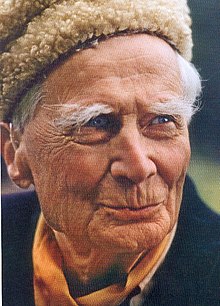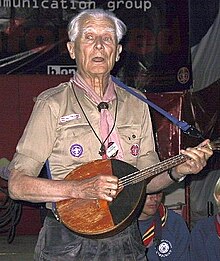Alexei Stachowitsch
Alexej Stachowitsch (born October 10, 1918 in Stockholm , † April 1, 2013 in Limburg an der Lahn ; also known by his journey name Axi ) was an Austro-Russian author, educator, songwriter , technician, scout , hiking bird and mountaineer.
In many circles Stachowitsch is one of the most important figures in the post-war youth movement in Germany and Austria. He was program director and camp song writer at the seventh World Jamboree in Bad Ischl , first headmaster of the Werkschulheim Felbertal , leader of the order in the Nerother Wandervogel , co-founder of the Balduinstein Free Education Center and founder of the Phoenix Boys' Association. Professionally, he worked in the field of communications technology, in the automotive industry and as an officer in the Austrian Armed Forces.
It was only after his death that it became generally known that Alexej Stachowitsch had committed sexual violence to numerous young people in the course of his life. Among those affected were also pupils and his guardians.
Life
Alexej Stachowitsch was born as the son of Michail Alexejewitsch Stachowitsch (1889–1967), a diplomat at the Russian legation in Stockholm . The Stachowitsch family from Palna-Michailowka in the Orjol governorate , south of Moscow , originally came from Poland , joined the Zaporozhian Cossacks in what is now the Ukraine and only later moved to Russia . After the October Revolution , the family fled through various European countries until relatives invited them to Salzburg in 1921 . There Stachowitsch attended elementary school and secondary school.
In 1929 Stachowitsch joined the Austrian Scout Association (ÖPB), Group Salzburg 2. In 1933 he took part in the fourth world jamboree in Gödöllő , Hungary , where he saw Robert Baden-Powell . In 1935, Stachowitsch acquired Austrian citizenship and was drafted into the Austrian Olympic squad. He was Salzburg youth champion in running in 1935 and 1936. Stachowitsch became a group leader in the ÖPB, but remained so for only two years until it was forced to dissolve in 1938. In 1937 he graduated from high school and began training as a radio electronics technician, at the same time as an officer candidate in the Vienna Army Telegraph Department. With the annexation of Austria to the German Reich in 1938, he went to the military school of the Wehrmacht in Hanover, where he passed his officer examination and became a lieutenant in 1939 . During the Second World War he was in the Army Intelligence Regiment on the Western Front , and later in Army Group South on the Eastern Front . After the war in 1947 he made a master's degree as a radio mechanic and worked in a workshop in Salzburg.
From 1945 he was significantly involved in the reconstruction of Austrian scouting ( Boy Scouts Austria , PÖ). He became regional field champion of Salzburg. The founding of the Salzburg Youth Council with his participation also fell during this time. He composed the camp song for the "Camp of Friendship" in the Montafon Valley in 1946 with German, Swiss, Austrian, French and Italian scouts, the first camp of this kind after the Second World War. In 1947 he took the Woodbadge course at Gilwell Park in England. As an assistant to the International Scout Office, he assisted in the reconstruction of the German scout movement in 1948 and became a co-founder of the Association of German Scouts (BDP). He gave lectures on the youth movement at the Philosophical Faculty of the University of Salzburg, became a member of the International Scout Conference and studied applied psychology and sociology in America on a scholarship. In 1950 he became one of the organizers of the PÖ's first Gilwell course. At the seventh World Jamboree in Bad Ischl in 1951, he was responsible for the program and writer of camp songs. In the same year he founded the Felbertal Werkschulheim in Ebenau and became the first headmaster. After he had given up the management of the school in 1958, he started manufacturing at the Simca car company , and later switched to the commercial area.
His first visit to Waldeck Castle took place around 1961 , where he came into contact with the Nerother Wandervogel and made friends with its federal leader, Karl Oelbermann . In 1963 he took over the boys group "Cossack Order" as order leader in the Nerother Wandervogel. 1964 Stachowitsch took over the representation of the general management of Simca in Germany in Raunheim . A little later, Stachowitsch switched to the communications consulting office in Frankfurt am Main. He took up an extensive travel activity. From 1972 he was an employee of AEG -Telefunken AG in Backnang . In 1973 he put down the leadership of the boys group "Cossack Order" and withdrew as an old Nerother from active group work in the Nerother Wandervogel. The following year he was a co-founder of the education and meeting center at Balduinstein Castle. In 1976 he founded the Phoenix Boys' Association, whose federal leader he was until 2011. In 1981 Stachowitsch moved into Balduinstein Castle and became editor of the magazine Keyword . In 1983 he bought the "Phoenixhof" in Weroth (Westerwald) as a retirement home, which was converted into the center of the Phoenix Boys' Association. In 1988 Stachowitsch worked in the organization of the Meissner camp. Due to different objectives, Axi ended its collaboration with the Balduinstein educational institute in 1989. In 1991 Stachowitsch worked briefly in the Russian Aid of the Red Cross as head of the delegation. In the same year he was appointed honorary colonel of the Siberian Cossacks. In 2001 he took part in the reunion “50 Years Jamboree Bad Ischl”. Since 2003 he has been the holder of the Golden Lily of the PPÖ, the second highest award of the PPÖ after the Silver Capricorn. This honor was unanimously revoked posthumously in July 2017 in a resolution of the Federal Council of the PPÖ. This decision was, among other things, a reaction to an article in the keyword in which the federal leader of the boys' union Phoenix reported about border violations and sexual assault by Axi in the course of his life. Stachowitsch was involved in numerous events, such as the "Augsburg, Würzburg and Rhenish Singewettstreit", the Untermerzbacher Kreis , initiated by scouts and youth from the Bundestag . He died on April 1, 2013 in Limburg / Lahn and was buried in the family grave at the Salzburg municipal cemetery.
Stachowitsch was an Orthodox Christian. He was married and two of his three children died young.
Publications
- Cossack watch . 1964.
- Sense and nonsense. An alliance challenge . Publishing house Horst E. Visser, Duisburg 1974.
- Joy . Südmarkverlag, Heidenheim 1981. ISBN 3-88258-059-3 . (Songbook)
- Alliance life - what for? Deutscher Spurbuchverlag, Baunach 1995. ISBN 3-88778-199-6 .
- School an adventure . Guggenberger Verlag, 2001. ISBN 3-901928-07-3 .
- Waymarks - songs and thoughts of a lifetime . Deutscher Spurbuchverlag, Baunach 2006. ISBN 978-3-88778-304-4 .
- numerous texts in: Bündisch ist ... Contributions to the question of Bündisch . Free educational organization Balduinstein, Balduinstein 1977. (2nd edition 1979)
Discography
- Ty morjak, the order of the Cossacks in the Nerother Wandervogel sings 21 songs under the direction of Alexej Stachowitsch . Thorofon, 1974. FTH 134.
Songs A – Z written by him
A.
- Adveniat, come Lord Christ
- All roads on earth lead everyone in a circle
- On tracks that the wind has long since blown away
- All driving goes out of the fog in bright light
B.
- Break me roses, red roses
- Brothers up (Jamboreelied Bad Ischl, 1951)
D.
- The regiment is already pulling on the bank
- The mind is tired, the hope is empty (driving)
- The forest looms like a shadow
- Thunderstorm
- Through the night and through tiredness
- Through Spain's hot zones
E.
- Eh the sun over mountain and valley
- Just singing out once (joy)
- A song is blooming without turning
- The wind from the Tauern is whistling
F.
- Friends loves life like a celebration
H
- Heio, we're going into the world
- Today roses bloom from stones
I.
- I have something against mass madness
- I saw the forest change color
- Sing into the wind, into the wind
K
- Nibble on your aunt's bones
L.
- Let life spray
- Let the junk rust
- To gain love from all
M.
- May the body lie in rocks
- My whole life is driving
- I am not granted peace
- Do not strive in vain brothers
P
- Scouts, watch out
R.
- The dark robs horizons
S.
- They go to all over the world
- That's how the Tauern wind whistles
- The sun burns into every fiber
T
- Tam, gde volny
- Thailand (green tide in the rainforest)
- Raging, cheering and wild dancing
- Ty wsaidi
- Turkish sun burns down on us
U
- And sound soft songs
V
- Lost and lost, the eyes ask in silence
- The foehn storms from the Tauern
W.
- What is it to you if we like it differently?
- Why do you brothers hang their heads?
- Expanses, endless expanses, nowhere does the step rest
- When a thousand donkeys scream
- Wind reaches into the woods, tree tops billowed green
- We always revolve around things
- We have been long, we have traveled far (Gaudia aeterna)
- We no longer carry lances
- We walk through the streets laughing
- Wolf, wolf, wolf
Individual evidence
- ↑ Almut Widdershoven (author) : Without showing up: Networks of sexual abuse in the German boy scout and youth movement , Königswinter 2019.
- ↑ Дворянский род Стаховичей (Russian, accessed April 3, 2013)
- ^ Felix Prautzsch: Axi light and shadow . In: Keyword . No. 202 , 2016, p. 32-39 .
- ↑ Sheet music of the Jamboreelied ( Memento from March 5, 2007 in the Internet Archive )
literature
- Cornelissen, Hanns: Alexej Stachowitsch, Knowledge and Fulfillment , 1st edition 1999, Deutscher Spurbuchverlag, ISBN 3-88778-234-8 .
- Kurt Pribich: His whole life was driving in PPÖ-Brief 4/2003, p. 27.
- Scouting 1/98: A legend turns eighty , p. 17.
- Scouting 1/07: The interview on the 89th birthday , pp. 15-17.
- Felix Prautzsch: Axi-Licht und Schatten, in keyword 202/2016, pp. 32–39.
Web links
- Literature by and about Alexej Stachowitsch in the catalog of the German National Library
- What are we talking about? Definitions and remarks for alliance discussions - attempt of an alliance lexicon
- Alexej Stachowitsch in "Pathfinder wiki, scout-o-wiki"
- The songs / works Alexej Stachowitsch, listing with publication date at deutscheslied.com
| personal data | |
|---|---|
| SURNAME | Stachowitsch, Alexej |
| ALTERNATIVE NAMES | Axi |
| BRIEF DESCRIPTION | Austro-Russian author, educator, philosopher, songwriter, technician, boy scout and wandering bird |
| DATE OF BIRTH | October 10, 1918 |
| PLACE OF BIRTH | Stockholm |
| DATE OF DEATH | April 1, 2013 |
| Place of death | Limburg on the Lahn |

